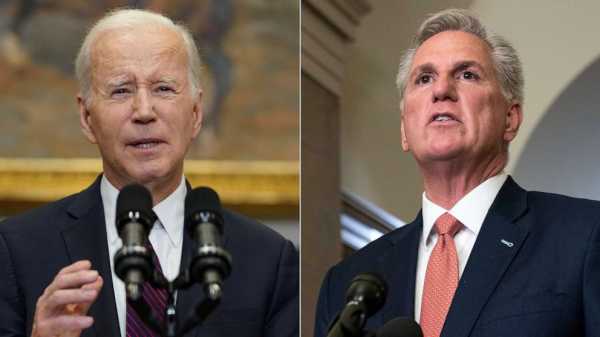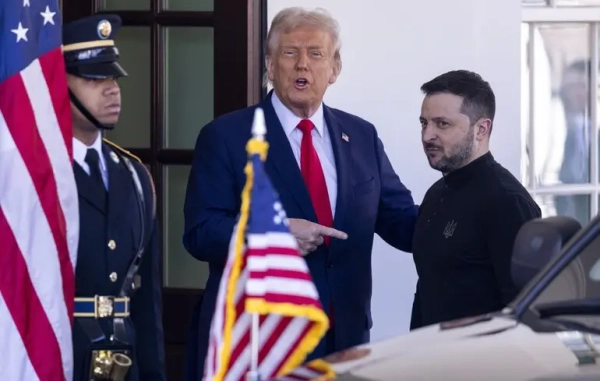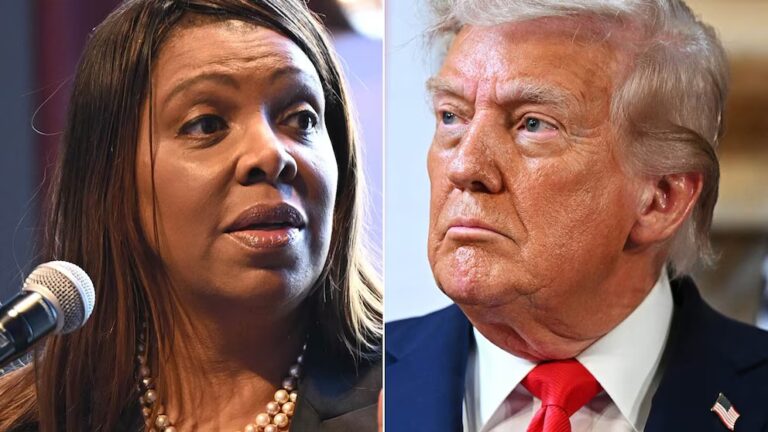After signs of at least incremental progress, high-stakes negotiations on avoiding a disastrous debt default abruptly stalled Friday, with a standoff over proposed spending cuts a key sticking point.
House Republicans said they were pressing pause on talks, citing the White House's "unreasonable" position — a major snag that comes amid a shrinking timeline for lawmakers to reach a deal or risk default.
MORE: After optimism, debt ceiling talks on 'pause,' McCarthy's top negotiator says
The White House said the two sides face "real differences" when it comes to spending but it still believed a bipartisan agreement was "possible."

Split image showing President Joe Biden speaking to reporters in the Roosevelt Room at the White House in Washington, May 9, 2023, and Speaker of the House Kevin McCarthy speaking during a news conference on Capitol Hill after meeting at the White House with President Biden about the debt ceiling, May 16, 2023, in Washington.Kevin Lamarque/Reuters and Jacquelyn Martin/AP
The apparent breakdown comes as opposing factions were raising the pressure on both the left and the right, raising questions about whether, even if a deal were reached, it would have enough support to pass Congress.
The House Freedom Caucus, a group of hardline conservatives, on Thursday urged Republicans to stop "any further discussion" and instead forge ahead with their partisan Limit, Save, Grow Act.
On the other side of the aisle, progressive Democrats appear concerned the negotiations could result in Biden giving up too much to Republicans. A group of Senate Democrats, led by independent Sen. Bernie Sanders, called on Biden to use the 14th Amendment — which says the "validity of the public debt … shall not be questioned" — to unilaterally raise the debt ceiling.
With the nation barreling toward a default possibly as early as June 1, here's a look at what's been on the table in the negotiations.
Spending caps
Sources familiar with the talks told ABC News' Rachel Scott that the issue of spending caps has emerged as one of the biggest sticking points in the negotiations.
"Look, we can't be spending more money next year. We have to spend less than we spent the year before. It's pretty easy," House Speaker Kevin McCarthy said Friday, repeating a Republican red line in the showdown.
The House budget bill would slash 2024 discretionary spending to 2022 levels, and limit federal spending growth to 1% per year for a decade. Biden's budget proposal, on the other hand, proposed a 9.4% increase in discretionary spending and annual 1% increases for a decade.
Even though the Republican plan to raise the debt ceiling — tied to spending cuts — doesn't detail exactly where the cuts would come from, the White House has claimed going back to 2022 levels would mean a 22% reduction in domestic programs, in everything from cancer research, to education, to veterans’ health care.

2:25
Here’s how much the U.S. spends on health care, military and education.
Work requirements
Another thorny aspect of the negotiations is the Republican plan to bolster work requirements for recipients of government aid, including Medicaid and SNAP food assistance, something progressive Democrats strongly oppose.
Biden earlier this week opened the door to adding some requirements but insisted they wouldn't be of "any consequence."
"I'm not going to accept any work requirements that's going to impact on medical health needs of people," he said.
McCarthy has laughed off Biden's comments, saying during a press conference: "Anything that has consequences? This is the senator who voted for work requirements."
Energy permitting reform
One area of possible compromise was on speeding up energy permit approvals to ease development.
But both parties are eyeing different reforms: Democrats have been seeking to speed up renewable energy projects while Republicans are looking to ramp up gas and oil line productions.
MORE: All the debt ceiling options, explained, if Biden and McCarthy don't reach a deal
Unspent COVID-19 relief money
Biden also said he was willing to take a look at clawing back some $30 billion in untapped pandemic-related aid — another provision of the GOP's Limit, Save, Grow Act.
"We don't need it all, but the question is what obligations were there made — commitments made, the money not disbursed?" he said after his first sit down with congressional leaders on May 9.
Sourse: abcnews.go.com






